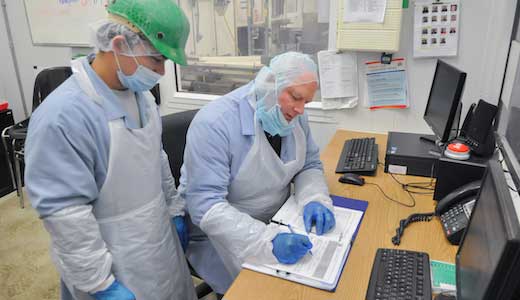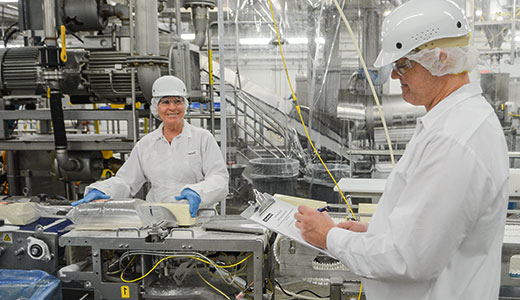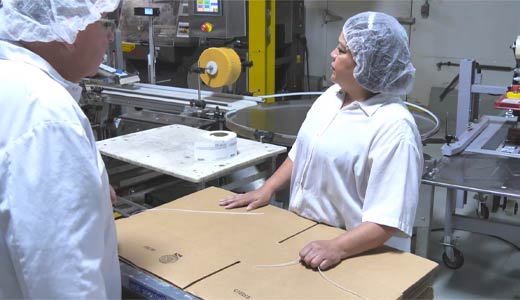Posted by Zosi Learning

Building a Strong Food Defense Culture: Why Everyone in Your Facility Plays a Role
In today’s complex food production landscape, protecting the food supply from intentional adulteration has become a top priority. A strong food defense culture is vital for ensuring this protection—a culture that engages every individual within the facility to recognize vulnerabilities and act decisively when risks emerge.
Food defense cannot rest solely on the shoulders of the food defense qualified individual. It is a collective effort that requires participation from employees at every level.
This blog will explore why cultivating a food defense culture is essential, how to lay its groundwork, and the pivotal role training plays in fostering its success.
Watch: How to Build a Food Defense Culture
Why a Food Defense Culture Matters
Collective Awareness
Establishing a robust food defense culture begins with a shared sense of awareness. Every employee, from frontline operators to senior management, must understand the risks inherent in food production processes and be equipped to respond effectively. Frontline workers, in particular, serve as the first line of defense. By empowering them with knowledge and tools, they can take proactive measures to prevent intentional adulteration.
Programs like Food Safety Culture Course ensure that employees grasp the importance of their role in maintaining food safety and security. Building food defense awareness starts with equipping every individual with the knowledge they need to act decisively.
Expanding Responsibility
The food defense qualified individual is integral but cannot oversee every detail. Expanding responsibility to include all employees fosters a facility-wide commitment. This creates a vigilant workforce capable of identifying and addressing potential threats as they arise, ensuring no gap in the defense system.
Involving all employees highlights the importance of food defense and makes intentional adulteration prevention a collective effort, building a proactive and resilient defense framework.
Foundations of a Food Defense Culture
Key Pillars: Training, Communication, and Collaboration
- Training: Provides employees with the skills to detect and mitigate potential risks. Comprehensive training programs, such as Food Defense Awareness Training, are designed to ensure employees understand how to recognize vulnerabilities and act appropriately.
- Communication: Ensures clarity on roles and the proper escalation of concerns. Open and clear communication channels strengthen the defense system by enabling swift responses to potential threats.
- Collaboration: Encourages teamwork across departments to strengthen the overall defense framework. Cross-functional collaboration is key to creating an effective food defense program.
Regulatory Requirements
Food defense awareness training is not only a best practice but often a regulatory obligation. Employees at critical points must be trained to implement mitigation strategies effectively, reinforcing the organization’s ability to safeguard the food supply. Programs like the Food Defense Manager Course ensure compliance with regulations while empowering employees to address potential risks confidently.
Real-World Examples of Food Defense in Action
Incident 1: Disgruntled Employee in Minnesota
In one case, a disgruntled worker attempted to contaminate food by introducing dirt into the product. Trained employees promptly identified the issue, reported it, and escalated the matter through the proper channels, including notifying the FBI. The swift response prevented the contaminated food from leaving the facility, demonstrating the critical role of training in intentional adulteration prevention.
Incident 2: Unverified Exterminator
At another site, a worker who had recently undergone food defense training noticed an unfamiliar exterminator on the premises. Despite the individual wearing a uniform, the employee verified their credentials with a supervisor, averting a potential threat. This highlights the role of employees in food defense and underscores the importance of vigilance and awareness.
These incidents show how well-trained and vigilant employees can prevent food fraud and protect the integrity of the food supply.
The Role of Training in Building a Food Defense Culture
Food Defense Awareness Training
Programs like Zosi Learning’s Food Defense in 15 equip employees with actionable insights and ensure compliance with food defense regulations. In just nine minutes, employees can gain a clear understanding of their role and responsibilities. By participating in Food Defense Training Programs, organizations can build a workforce capable of identifying and addressing threats before they escalate.
Long-Term Benefits
Effective training builds confidence and accountability. Over time, this fosters a proactive workforce that serves as a critical line of defense, capable of addressing potential threats before they escalate. When combined with ongoing communication and collaboration, these efforts strengthen the overall food defense culture, ensuring that organizations remain prepared for potential risks.
Conclusion
A strong food defense culture is the cornerstone of food supply protection and regulatory compliance. By prioritizing training, fostering communication, and encouraging collaboration, organizations can create a workforce that is vigilant, informed, and ready to act.
Take the first step in strengthening your food defense culture with Zosi Learning’s Food Defense Awareness Training, Food Defense for Supervisors, or Food Defense Manager courses. Empower your team today to safeguard tomorrow’s food supply.



 Food Defense Manager
Food Defense Manager
 Food Defense Supervisor Awareness
Food Defense Supervisor Awareness
 Food Defense in 15
Food Defense in 15

